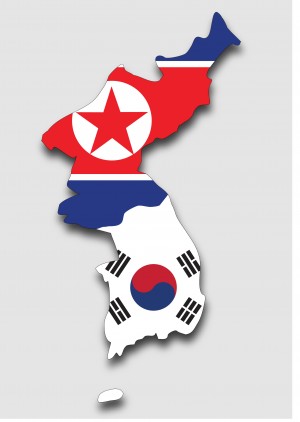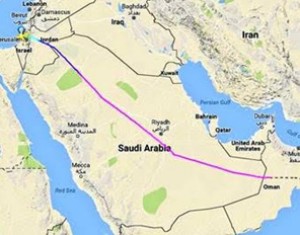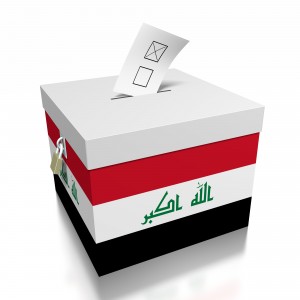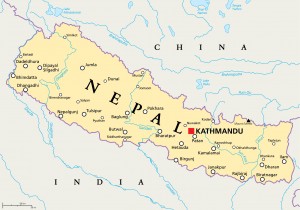Displaying items by tag: Asia
Saudi Arabia and Israel
Historically, Saudi Arabia has a hatred for Israel and Jews. No Jew may live in the kingdom, which has never opened diplomatic relations with Israel. For 70 years no Israeli passenger planes have been allowed over Saudi airspace. But there are now signs that this hostile stance may be cautiously changing. The Saudis have a ‘peace plan’ related to the Israeli-Palestinian conflict, and recently there have been rumours of secret communications between the two countries. When President Trump made his maiden trip abroad last May, his first stop was in Saudi Arabia. From there his plane made one of the few flights ever allowed from Arabia to Israel. Netanyahu recently spoke of Israeli relations with the Arab world (including Saudi Arabia) as ‘best ever.’ As of April 2018, flights from India over the Arabian Peninsula will take place three times a week.
Rescued from slavery in India
Impoverished families trafficked from central Indian states are forced to make thousands of clay bricks daily in appalling conditions. Victims don’t speak out due to intimidation. Officials can’t ascertain the truth. Fortunately, one 13-year-old boy told officials how he worked nine hours a day. His courage emboldened others. Teenage girls described carrying heavy stacks of bricks on their heads. A single mother shared the agony of not getting medical care for her sick child. Soon the local authorities had enough information to complete a rescue operation and bring the victims to safety. On 23 March, IJM reported, ‘nearly 150 children, women and men were rescued from bonded labour slavery in a single Indian brick kiln. Years ago, local leaders would not admit slavery still existed, let alone help families in need. Today the families are receiving medical care, food, ID cards, police protection and release certificates that break any bonds to former owners.’
Call for prayer for peace on the KoreanPeninsula
Evangelical Call to Prayer for Peace on the Korean Peninsula March27, 2018
As American Christians with diverse approaches to force and nonviolence and yet all committed to pursuing peaceful relations among people and nations, we unite in prayer for permanent peace on the Korean Peninsula. We do this mindful of the millions of lives, including more than 230,000 Americans, that would be threatened by an escalation of conflict there.
We are heartened by proposals for dialogue between our national leaders at a time when increasing tensions seemed to be marching our countries perilously in the direction of greater conflict, if not war. We call on all Christians everywhere to join us in praying for a just and peaceful resolution.
We pray for wisdom for our political, diplomatic and military leaders as they work across differences toward a goal of peace, security and freedom. We pray that God will bless the efforts of citizens who seek to bridge the vast differences between our countries.
Decades of people-to-people contact between North Korea and the United States- through business, educational and other humanitarian exchanges - have put a human face on those who are sometimes characterized by one another as enemies. So, we pray with empathy and in a spirit of friendship, noting the image of God in every human being. However profound the differences between our governments, we do not view the North Korean people as our enemies. On the contrary, we desire only the best for the people of North Korea.
Most of the nearly two million Korean-Americans are Christians, and many belong to evangelical churches. This community too has contact with North Koreans through humanitarian and family ties. South Korea is also home to many evangelical churches, including some of the world’slargest. Many of these Korean brothers and sisters have been praying for North Korea for years and we humbly join them. These connections with Koreans in North Korea, South Korea and the United States strengthen our resolve to seek God for mercy and, so far as it depends on us, to pursue peace between our respective countries.
Sincerely,
Leith Anderson – President -National Association of Evangelicals
HyepinIm
President/CEO & Founder
Faith and Community Empowerment
Dr. John P Hartley Chair
Evangelicals for Peace
Rev. Johnnie Moore Founder
The Kairos Company
Nikki Toyama-Szeto Executive Director Evangelicals for Social Action
More info at:http://www.evangelicalsforpeace.org/northkorea
PRAY: Let us continue to pray that the expected upcoming meeting between President Trump with Kim Jong Un will be used of the Lord to end the conflict, denuclearize the Korean peninsula and even to make possible the reunification of the two Koreas.
What is God doing in relations between Saudi Arabia and Israel?
(Image:Route of AI139 passenger flight from New Delhi to Tel Aviv 22 March 2018)
From the evening of her re-birth 70 years ago, Israel, has been always keenly aware and wary of the vast desert kingdom spreading southeastward from her western neighbor Jordan.
Six months previous, Saudi Arabia had cast their vote against the UN Partition Plan paving the way for the birth of the Jewish State. Now, hours after Israel’s Declaration of Independence, as five Arab armies began their invasion to stamp out the new state, allied under the Egyptian army was a mass of soldiers sent from the Arabian Peninsula.
Twenty-five years later, the Saudis would again send troops to support Egypt in the 1973 War. Afterwards, although there have been no further military overtures, Saudi Arabia has continued to be seen as an enemy nation, one with a hatred for Israel and Jews (By law, no Jew is allowed to live in the Kingdom). They have never opened diplomatic relations with Israel. It was with uneasiness that Israel witnessed in 2010 the US sale of $60 billion worth of F-15 fighters, attack helicopters and advanced munitions to this unfriendly nation, some of whose borders lie only minutes by air from our capital.
For 70 years no Israeli passenger planes have been allowed over Saudi airspace (When, some years ago, the authors travelled to Thailand, our plane was forced to fly southwards along the Arava through the Gulf of Aqaba, then down the length of the Red Sea—with enemy state Sudan to the west, Saudi Arabia to the East— on southward to just before the Horn of Africa, where we finally made a sharp left turn eastwards out over the Arabian Sea towards India—
In recent years, there have been signs that this official stance of hostility may be, at some levels anyway, beginning cautiously to change. The Saudis came out with a “peace plan” related to the Israeli-Palestinian conflict. More recently, rumors began to surface of secret communications between the two countries. When the newly-elected President Trump made his maiden trip abroad last May, his first stop was to Saudi Arabia—from there his plane made one of the few flights ever allowed from Arabia to Israel.
With the remarkable reforms which appear to be attending the rise of Crown Prince Muhammad Bin Salman Al Saud, an unprecedented warming of relations with Israel has begun to be spoken of as a legitimate possibility (PM Netanyahu recently spoke of Israeli relations with the Arab world—obviously including Saudi Arabia—as “best ever.” As of this week, the flights from India over the Arabian peninsula will continue three times a week.
Then this past Thursday night, history was made. For the first time in Israel’s 70 year history, a passenger plane from another country was allowed to travel the length of the Arabian Peninsula (see map above) en-route to Tel Aviv. The Air India Boeing 787 from New Delhi touched down at Ben Gurion Airport at 10:15 p.m. Israeli Transport Minister Yisrael Katz described the occasion as “the first time that there is an official connection between the state of Israel and Saudi Arabia.” Of its enormous significance, one Israeli analyst observed that even in the absence of an Israeli-Palestinian peace treaty (considered for years a prerequisite for relations between Israel and the Arab world), “this shows you can have small gestures that are of real meaning.”
The most generally held explanation for this thaw in relations is that the Sunni Saudi government is eyeing the expansion of its Shi’ite arch-enemy Iran and its nearness to acquisition of nuclear weapons, and is therefore open to (at least temporarily) making an alliance with the Israelis, whom the Iranian Ayatolla’s have repeatedly vowed to annihilate. While not discounting this as a factor, we sense it is essential that we seek the Lord as to what He—Lord of the Nations—is doing. Of course there is war in the heavenlies, with evil powers and principalities over nations at war against the decrees of the Elyon—the Most High—on behalf of His redemptive purposes on the earth.
We believe that through the present year a season of grace is being extended in which nations are being granted opportunity for making choices as related to their alignments with God’s purposes in His covenant land and people Israel. How they choose will significantly determine their pathway in the season ahead—whether for blessing and awakening or for darkness and great deception and delusion. During this year, there will be nations whose past histories would have indicated them to be last in embracing Israel, which will turn towards here—others with reputations as friendly will turn away.
During this window of opportunity, the determined efforts of intercessors, though small in number, may have great influence in swaying the stance of their leaders towards that which is good. It is remarkable that we see the leadership of Egypt, with whom Arabia allied strongly in both the 1948 and 1973 wars against Israel, slowly but steadily engaging in more friendly relations with her. We believe this is being surely facilitated through the prayers of millions of Christian believers and the many houses of prayer in that land who love and are praying fervently towards the fulfillment of the Isaiah 19 “Highway” which God says will connect “Egypt My people” with “Israel My inheritance.”
If God has such plans for Egypt, where His people suffered bondage for 400 years, might He not also have redemptive plans for the Arabian Peninsula, where it is appears that these same Children of Israel may have wandered for 40 years in the desert? (In fact, in the opinion of a growing number of Biblical scholars, many factors point towards the very Mountain where the LORD came down and spoke with Moses as lying, not in the “Sinai Peninsula,” but in that area of Midian on the “back side” (i.e. the Arabian side) of the Gulf of Aqaba).
Might not this area of the world in which the delusion of Islam arose—a delusion which holds vast throngs of people throughout the nations in a bondage not unlike that typified by Egypt before the Exodus—might not this area where His manifest presence once moved among His people Israel be one in which the God of Salvation longs to begin releasing freedom to captivities from evil—even from its very source? Perhaps this itself sounds delusional. But God, whose greatness will dwell in Jerusalem, is beginning to shake things—“Let the peoples tremble…let the earth shake, YHWH is great in Zion, He is exalted above ALL peoples…They SHALL praise Your great and awesome name: Holy is He!” (Psalm 99:1-3). This includes those in captivity to darkness in Saudi Arabia!
Some of the Body of Messiah in Israel is using the shifts we sense occurring to stir us to pray for His life and blessing to spread over this great enemy from our past. After all, a part of our call, from the beginning, has been that through the seed of Abraham, every family and nation will find blessing! (Genesis 12:3; 22:18).
Will you join with us!
PLEASE PRAY:
* That the Spirit which is drawing a new generation in Saudi Arabia towards regarding Israel with favor, will increase - that the leaders there would respond positively to this Spirit.
* That the “true Light which, coming into the world, enlightens every human being” (John 1:9), will illumine hearts of Muslims throughout the Arabian Peninsula to the truth that Issa-Yasuah-Yeshua-Jesus who was born in Bethlehem is the divine Son of God and saviour of the World (We personally have heard testimonies of former Muslims who were illumined by this Light while on the Haj in Mecca itself!).
* For Crown Prince Muhammad Bin Salman Al Saud, that He will be protected in mind and body; that the Power which has already been at work in him towards releasing freedoms towards women, and other areas of his society which have for centuries lain in unjust bondage and oppression, that this Power will reveal itself in a personal way.
* For Israel’s leaders, to regard the initiatives in Saudi Arabia with wisdom, discernment and grace. That God will work His alliances between the two countries out in His way and timing.
* That the grace and favor which is presently linking India and Israel will be released over the Arabian peninsula over which their flights are now free to take place!
“In world first, Air India crosses Saudi airspace to Israel”: AFP (Reprinted in The Times of Israel: 22 March 2018).
Martin & Norma Sarvis
Jerusalem
Pray for Christians in China
For decades we have strived to openly share news and prayer requests from Asia, as we seek to help God's people extend the kingdom of Jesus Christ.
In this newsletter we have a deep burden to share with you, and we ask for your fervent prayers and intercession for our brothers and sisters in the Chinese house churches. They are now undergoing a fiery trial that is more fierce than anything experienced in China since the Cultural Revolution of the 1960s and 1970s.
In the past 18 months, the situation for Christians in China has dramatically worsened. At the start, we hesitated to publicly share new information from China for a few reasons. Some of the news we have received from church leaders is so dire that most believers around the world simply wouldn't believe it if we told them. We also wanted to make sure these things were not part of a short-term crackdown, as over the years we have seen numerous seasons of persecution come and go in China. However, we believe it is now time to present the known facts, to help people understand what our fellow believers are experiencing right now.
We have also shared several links to web pages in this message, to help people learn more about the situation from other sources. Please take the time to read these articles.
* President Xi Jinping—who is about to have the constitution amended so he can remain in power for as long as he wishes—first raised concerns among Christians about three years ago when he spoke about the need to control "illegal religion". Persecution has markedly worsened since then, and hundreds of house church pastors have vanished over the past few years. Many are assumed to have been killed. Others may be held in "black jails" — secret facilities where they are tortured mercilessly. When someone enters a black jail they are usually never heard from again. Their families have no idea of their whereabouts, and all communication ceases.
* You are unlikely to hear much fresh information from the Church in China, because most mission organizations working in China have been targeted in recent years. Thousands of foreign Christians have been expelled from the country, while the large 'persecution' ministries have seen their Chinese contacts arrested. The result is that news about the Church in China is becoming difficult to access. The government appears to be trying to throw a blanket over the Church, so that the rest of the world can't see or hear what's going on inside the country.
* Christian activity in China has been strictly monitored, due to the presence of tens of millions of facial- recognition cameras that have sprung up in every city and town, and now even in villages. The data from these cameras is fed into a massive computer network around the clock. Using 'artificial intelligence', alerts are sent to the police if the computers detect any suspicious activity, such as a group of Christians gathering at a location for worship or Bible study. We encourage you to watch the following short video from the BBC. It is sobering, but will help you understand the challenges facing our brothers and sisters in China:
http://www.bbc.com/news/av/world-asia-china-42248056/in-your-face-china-s-all-seeing-state
* For decades, most members of Three-Self churches in China thought they were safe because they had registered with the government. Many looked down on the illegal house church networks and chided them for not "obeying the laws of the land." The distinctions between the two groups are now blurred. Hundreds of Three-Self pastors have also been arrested in the last few years, and church buildings have been demolished by special paramilitary forces. The largest single worship center in China, the Golden Lampstand Church in Shanxi Province, had a congregation of more than 50,000 members. The building, which was constructed with official permission, was recently blown up by the Chinese authorities and is now a pile of rubble:
http://www.dw.com/en/in-xi-we-trust-is-china-cracking-down-on-christianity/a-42224752
* Last year the government announced draconian new laws designed to punish "illegal religion" (i.e. all worship or activity outside the control of the atheistic Communist Party). These new laws, which came into force last month, include fines of up to US$30,000 for holding prayer meetings or Bible studies, while Christians who travel out of the country (including to Hong Kong) to attend conferences or other Christian events may be arrested and fined up to US$50,000. These amounts are more than a lifetime's income for many Chinese believers. Pressure is also being applied to those who associate with Christians. For example, landlords face heavy fines if they rent a property to any believers who subsequently use it for meetings.
* As a result of this massive suppression, in the past year almost all house church networks we serve have stopped holding large gatherings, and most have broken down into tiny groups of no more than 4 or 5 believers. Even small meetings like this carry risk of detection and police action, so great is the control being exerted.
* In some parts of the country, thousands of Chinese Christians have been arrested. The worst of all is in northwest China, where the government has cast a wide net to demolish the threat of Islam, with at least 120,000 people currently believed to be held in concentration camps in the region:
https://www.theguardian.com/world/2018/jan/25/at-least-120000-muslim-uighurs-held-in-chinese-re-education-camps-report
Many Christians in Xinjiang, both Han Chinese and ethnic minority believers, have been rounded up and sent to the same concentration camps. Church leaders we work with have told us things there are "worse than during the Cultural Revolution."https://www.worldwatchmonitor.org/2018/02/china-100-christians-sent-re-education-camps-xinjiang/
* The supply of Bibles to Chinese Christians has been severely reduced.The house churches have never been officially allowed to access Bibles, but now the registered churches are also reporting a great shortage. Last year, the few remaining Bible courier ministries that were operating from Hong Kong also closed down. A decade ago, Asia Harvest was one of about a dozen known ministries providing Bibles to the house churches of China. Most of those groups have since been forced out of the country through threats, intimidation, seduction, and other means.
We have received reports of some who carried Bibles into China recently being stopped at the border. In the past, officials would confiscate the Bibles and allow the person to continue on their journey. Now, those caught with Chinese Bibles have been interrogated for up to 12 hours, expelled from China, and banned from coming back for 10 years. We believe the overall purpose is to isolate the children of God in China by strangling the supply of God's Word. Many Chinese Christian websites, Bible apps and other resources have also been blocked by the government.
* China is also extending its anti-Christian influence into neighboring countries. We have received reports of believers in Nepal, Myanmar, Laos and Vietnam being warned not to spread the Gospel across their borders into China, or they will face severe consequences.
Summary: Few Christians around the world imagined that China would ever return to its intense anti-Christian persecutions like during Mao's rule, but things are lining up for a brutal and prolonged period of struggle for Christians in China. In many ways, because of new technology, believers face an even greater challenge than during the dark days of the Cultural Revolution. Many in the West thought that Communism collapsed with the breakup of the Soviet Union in the early 1990s. Politicians were certain that free market reforms would cause China to open up and embrace democracy. They were wrong. The dark forces of aggressive, God-hating atheism are alive and well in China, North Korea, and other parts of the world.
Please Pray for China
* Praise God that He has done a wonderful work of grace in China during nearly 70 years of Communist rule! Today there are at least 100 million Christians in the country, many of whom love the Lord Jesus with all their hearts and are willing to lay down their lives for the Gospel. Pray this persecution will cause the Church to rise up and claim even more of their country for the kingdom of God.
* Please pray the kingdom of Jesus Christ would be strengthened and would grow even larger as a result of the current anti-Christian campaign. Pray that Satan would not have his way, but that God's children would be covered by the Blood of Jesus and would come through the tribulations refined like pure gold.
* Ask God to glorify His Name once again among the people of China, and that by breaking down into tiny groups of believers, the churches will get back to the basics of the faith and introduce more people to the Lord than ever before.
* Most of the younger generation of Christian leaders in China have never experienced severe, physical persecution. Understandably, many are nervous. Please pray our Heavenly Father would reveal Christ's all-sufficiency to them, and they would come through to the other side closer to God and better equipped to lead His people.
* Pray the Holy Spirit would give His children heavenly wisdom and strategies to know what to do in this crisis, and that the transformative power of the Gospel will continue to be shared to the one billion people in China who have not yet bowed their knee to the Lord.
* By God's hand, Asia Harvest has provided almost 11 million Bibles to the house churches in China over the years. We wish it was many millions more! The pressure is intense, but please pray the Lord will continue to hold open the door for us to continue. Please intercede for our Chinese co-workers who oversee the projects. As long as there is a slight opening, we want to faithfully continue to obey what God first called us to do 30 years ago.
* Satan and wicked men have continually tried to destroy God's people in China over the centuries, but God's plans have progressed regardless. Pray the King of Kings would confound the present generation of rulers, and they would learn the lesson that many before have discovered, dating back to the time of Pharaoh's persecution of God's children, when the Bible says, "The more they were oppressed, the more they multiplied and spread; so the Egyptians came to dread the Israelites" (Exodus 1:12).
Please feel free to share this message with any concerned believers, or to post it on social media etc.
Until All have Heard of Jesus,
The team at Asia Harvest
www.asiaharvest.org
Pray for Iraq and its Elections
Our nation has come out of the dark tunnel of ISIS with a heavy burden of mass corruption and many political parties.
The nation is heading for an election mid of May, we need a Divine intervention to choose the right person that will bring the ship to the right shore.
PM EL-Ebady has proven to be a godly person who is clean and sincere to the nation. I have called many to agree with us to pray that he will win the seat for PM for a second term.
Thus, kindly agree with us for this.
Unemployment is very high; education and health services are the lowest in 50 yrs. I am very optimistic that should Mr. El- ebady win, then many positives then take place.
Blessings and thanks,
A Prayer Leader friend in Baghdad
Pray for Nepal
Greetings in the name of our mighty Lord Jesus Christ.
Today we had blessed prayer meeting in House of Prayer. Yes, God is continuing His works in Nepal through His people.
Please pray for our newly formed central government and the 7 states of Nepal, very small country but more states.
Pray for rain in Nepal now very much dry allover the Nepal.
Please pray for sustainable country of Nepal and good government.
Please pray for God's hand for prosperity and blessing upon our country.
We are so much thankful to your regular prayer and love for Nepal. We honor your heart for the Lord!
Thank you for loving us and praying for us and investing us for His Kingdom.
May the Lord bless you
Govinda and Sujita
New Zealand: new Asian era?
China’s Xi Jinping is now ‘president for life’, which many believe will cause NZ prime minister Jacinda Ardern’s government to change its Asian foreign policy and identify potential new paths. President Trump has been inconsistent in Asia as he aims to meet US interests. Ardern’s government identifies nuclear disarmament and climate change as key areas for international engagement. Australia does not support nuclear disarmament in the same way NZ does, and its action on climate change domestically is comparatively modest. Maintaining the rules-based order in the region will depend on partnerships with the US, Japan‚ and (increasingly) India. Many believe established traditions will be tested, but not abandoned altogether. This dynamic is not exclusive to NZ, with the current geopolitical changes in the new era.
South Korea: work ethos
South Korea has some of the longest working hours in the world. Government employees work approximately 2,739 hours a year, 1,000 hours more than workers in other developed countries. The Seoul metropolitan government is introducing an initiative forcing employees to leave work earlier. Computers will be powered down at 20:00 on Fridays to stop a ‘culture of working overtime’. The shutdown comes in three phases, beginning on 30 March with computers switched off by 20:00. In April employees computers will be turned off by 19:30 on the second and fourth Friday, then from May onwards all computers will power down by 19:00 every Friday. 67.1% of government workers have asked to be exempt from the forced lights-out. Numerous surveys across the nation have found that stress and long hours of modern office jobs destroy not only health but family life.
Syria: another crisis developing
German Chancellor Angela Merkel addressed the Bundestag in Berlin on 21 March and condemned as ‘unacceptable’ Turkey’s military offensive in Syria’s northern town of Afrin. She criticized Russia for ‘just watching’ the continuing attacks by Syrian forces on eastern Ghouta. The previous day the UN called for full access to civilians in both places. Ankara said its military operations are defensive and criticised Berlin for not doing more to crack down on supporters of the PKK in Germany. Turkey’s response to America arming Kurdish Syrian Democratic Forces in the area is to launch military operations against the Kurdish-controlled Afrin region, risking further confrontation.The lives and safety of 350,000 Afrin civilians are at risk. Pray for the families who are being charged thousands of dollars by Syrian forces for safe passage into government-held areas. See also:- https://www.reuters.com/article/us-mideast-crisis-syria-turkey-germany/germany-condemns-turkish-military-offensive-in-syria-idUSKBN1GX1EI









